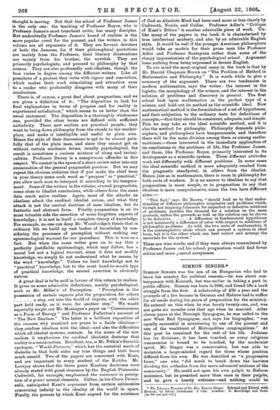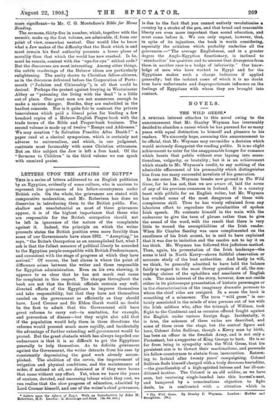SIMEON SINGER.*
SIMEON SINGER was the son of an Hungarian who bad to leave his country for political reasons,—he was about con- temporary with Kossuth, but was earlier in taking a part in public affairs. Simeon was born in 1846, and found life a haid struggle from the first. A scholarship of £30 a year and the proceeds of a few lessons in German and Hebrew bad to suffice for all needs during his years of preparation for the ministry. He entered on this when he was barely twenty-one, and was not quite six months over that age when he married. After eleven years at the Borough Synagogue, he was called to the new West End Synagogue, and, says his biographer, " was equally successful in ministering to one of the poorest and one of the wealthiest of Metropolitan congregations." At this post he remained for the rest of his life. Judaism has its divisions ; it has been touched, as every religious communion is bound to be touched, by the modernist spirit. Mr. Singer was a conservative, but was able to maintain a large-minded regard for those whose position differed from his own. He was described as "a progressive force," one who " did much to break down the barriers dividing the orthodox from the more advanced sections of the community." He could not open his own pulpit to Reform ministers, but he preached more than once in their pulpits, and he gave a hearty welcome—and nothing could be • The Literary Remains of the Rev. Simeon Singer. Selected and Edited, with Memoir, by Israel Abrahams. 3 vols. London G. Boutledge and Sons. [4s. 6d. net per vol.] niore,significant—to Mr. C. G. Montefiore's Bible for Home Beading. The sermons, thirty-five in number, which, together with the memoir, make up the first volume, are admirable, if, from our poi# .of view, somewhat neutral.. One would like to know a what Jew makes of the difficulty that the Book which is and must remain his final authority presents a lower plane of morality than that which the world has now reached. Is he, must he remain, content with the "eye-for-eye" ethical code ? But the discourses are most interesting. Among other things, the subtle renderings of the Hebrew idiom are particularly enlightening. The amity shown to Christian fellow-citizens, as in the discourse delivered before the Corporation of Ports- mouth (" Judaism and Citizenship "), is all that could be desired. Perhaps the protest against burying in Westminster Abbey. as " poisoning the living with the dead " is a little out of place. Our great men are not numerous enough to make a serious danger. Besides, they are embedded in the hardest concrete. Nor is it quite fair to contrast the private benevolence which paid a liberal price for binding - a few hundred copies of a Hebrew-English Prayer-book with the trade terms of the Bible and Prayer-book business. The second volume is made up. of twelve " Essays and Addresses." We may mention ." Is Salvation Possible After Death ?" a paper. read at a clerical symposium, which is certainly not adverse to . universalism, and which, in our judgment, contrasts most favourably with some Christian utterances. But .on. this subject the Jew is left a free band. Of the " Sermons to Children" in the third volume we can speak with unmixed praise.



































 Previous page
Previous page